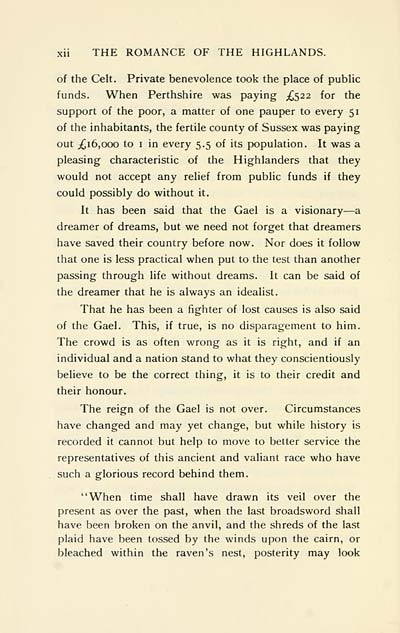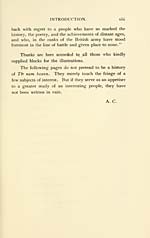Download files
Complete book:
Individual page:
Thumbnail gallery: Grid view | List view

xii THE ROMANCE OF THE HIGHLANDS.
of the Celt. Private benevolence took the place of public
funds. When Perthshire was paying ;iC522 for the
support of the poor, a matter of one pauper to every 51
of the inhabitants, the fertile county of Sussex was paying
out ;{^i6,ooo to I in every 5.5 of its |X)pulation. It was a
pleasing characteristic of the Highlanders that they
would not accept any relief from public funds if they
could possibly do without it.
It has been said that the Gael is a visionary — a
dreamer of dreams, but we need not forget that dreamers
have saved their country before now. Nor does it follow
that one is less practical when put to the test than another
passing through life without dreams. It can be said of
the dreamer that he is always an idealist.
That he has been a fighter of lost causes is also said
of the Gael. This, if true, is no disparagement to him.
The crowd is as often wrong as it is right, and if an
individual and a nation stand to what they conscientiously
believe to be the correct thing, it is to their credit and
their honour.
The reign of the Gael is not over. Circumstances
have changed and may yet change, but while history is
recorded it cannot but help to move to better service the
representatives of this ancient and valiant race who have
such a glorious record behind them.
"When time shall have drawn its veil over the
present as over the past, when the last broadsword shall
have been broken on the anvil, and the shreds of the last
plaid have been tossed by the winds upon the cairn, or
bleached within the raven's nest, posterity may look
of the Celt. Private benevolence took the place of public
funds. When Perthshire was paying ;iC522 for the
support of the poor, a matter of one pauper to every 51
of the inhabitants, the fertile county of Sussex was paying
out ;{^i6,ooo to I in every 5.5 of its |X)pulation. It was a
pleasing characteristic of the Highlanders that they
would not accept any relief from public funds if they
could possibly do without it.
It has been said that the Gael is a visionary — a
dreamer of dreams, but we need not forget that dreamers
have saved their country before now. Nor does it follow
that one is less practical when put to the test than another
passing through life without dreams. It can be said of
the dreamer that he is always an idealist.
That he has been a fighter of lost causes is also said
of the Gael. This, if true, is no disparagement to him.
The crowd is as often wrong as it is right, and if an
individual and a nation stand to what they conscientiously
believe to be the correct thing, it is to their credit and
their honour.
The reign of the Gael is not over. Circumstances
have changed and may yet change, but while history is
recorded it cannot but help to move to better service the
representatives of this ancient and valiant race who have
such a glorious record behind them.
"When time shall have drawn its veil over the
present as over the past, when the last broadsword shall
have been broken on the anvil, and the shreds of the last
plaid have been tossed by the winds upon the cairn, or
bleached within the raven's nest, posterity may look
Set display mode to: Large image | Transcription
Images and transcriptions on this page, including medium image downloads, may be used under the Creative Commons Attribution 4.0 International Licence unless otherwise stated. ![]()
| Early Gaelic Book Collections > Ossian Collection > Romance of the Highlands > (20) |
|---|
| Permanent URL | https://digital.nls.uk/81815865 |
|---|
| Description | Selected books from the Ossian Collection of 327 volumes, originally assembled by J. Norman Methven of Perth. Different editions and translations of James MacPherson's epic poem 'Ossian', some with a map of the 'Kingdom of Connor'. Also secondary material relating to Ossianic poetry and the Ossian controversy. |
|---|
| Description | Selected items from five 'Special and Named Printed Collections'. Includes books in Gaelic and other Celtic languages, works about the Gaels, their languages, literature, culture and history. |
|---|

